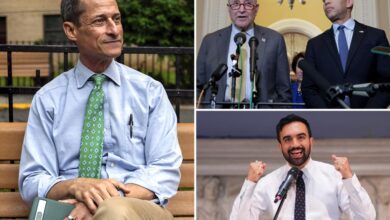Billionaire developer threatens quitting construction in wealthy California enclave as zoning war erupts

A war over zoning regulations is pitting neighbor against neighbor in the idyllic coastal enclave of Carmel-by-the-Sea, CA, where a faction of residents is desperately attempting to block a new mixed-use development, despite the village’s dire housing shortage.
Earlier this month, tensions erupted at a city council meeting in the quaint historic town, after the group opposing the development, known as the JB Pastor project, filed an appeal to block construction on the grounds that the plans lacked adequate parking, among other reasons.
Although the local planning commission had unanimously approved the project after six painstaking years of review, and a report from city staff recommended denying the appeal, the council failed to reach a final ruling on the objections, punting the decision until at least next month.
The decision left billionaire European developer Patrice Pastor, who named the mixed-use commercial and residential project in honor of his late great-grandfather, in bitter disbelief.
“Following this latest city council meeting it’s clear that I need to reconsider my investment in Carmel,” Pastor said in a statement to SFGate. “It’s time to leave this strange community, if you can call it a community.”
Pastor, a native of Monaco and heir to a real estate development empire, has been active in Carmel for a decade, acquiring more than $100 million in property across the tiny seaside village that is beloved by Hollywood celebrities.
Through his development company Esperanza Carmel, Pastor has acquired, managed, and renovated a number of high-end properties across the village, including the La Rambla building, L’Auberge Carmel Hotel, the Bingham building, and the Carmel Beach Hotel.
Pastor’s outsized presence in the tiny village of 1 square mile has ruffled more than a few feathers among locals, with some residents fearful that he will disrupt the area’s historic charm, or suspicious that his wealth and status give him license to flout strict zoning and preservation rules.
But many other residents have welcomed his investments, and believe the town sorely needs the roughly 20 long-term apartment rentals that would be created between the JB Pastor project and another stalled Pastor development, the Ulrika Plaza project.
“There is a brazen shortage of long-term rentals and affordable housing in Carmel,” Erik Bueno, a retired real estate broker and resident of Carmel for more than 30 years, said in a letter supporting the JB Pastor project. “I believe this project will bring long-term value to the neighborhood and serve as a catalyst for further positive growth.”
Carmel resident Carol Williams, who moved to the village 50 years ago and founded an art gallery there, told Realtor.com® that she had always dreamed of helping her daughter purchase a condo nearby. But with prices for those condos now exceeding $3 million, it simply wasn’t attainable.
“My daughter’s generation of Carmelites are nearly all renting if they desire to remain in Carmel,” she says. “I founded a gallery and am a self-employed, small business owner. I bought my first Carmel home for $250,000, and no one expected the local real estate market to price out our own children.”
Realtor.com listing data shows that in July, the median home in Carmel was priced at more than $2.4 million—more than three times the median price in California and nearly six times the median price nationwide.
An additional challenge for longtime Carmel residents is Prop. 19, a California law passed in 2020 that triggers higher property taxes for heirs after the owner of a home dies, by mandating a reassessment at current market value.
Williams says that in Carmel, these “eye popping” new tax bills often force the younger generation to sell inherited homes when their parents die.
“So it is the younger generation of Carmelites, who today are small business owners or successful local artists and working health care professionals, that need rentals like the ones that Pastor was proposing to build for us,” she says. “I believe there are many people in the local community who would love to remain in Carmel and walk to work, but can’t find any suitable long-term rentals.”
Initially, Williams was shocked to learn that a group of her neighbors had banded together to file an appeal in a last-ditch attempt to block Pastor’s new project, which would add much-needed rental apartments.
“However, admittedly there is a long-standing group of fierce city conservationists who will oppose any changes to Carmel they consider too ambitious and seem very dedicated to keeping the status quo,” she says. “So I was not really surprised they weighed in, although after all these years their latest delay tactics seem excessive.”
Opponents of the JB Pastor development have raised concerns that it violates local zoning ordinances, while not so subtly implying that cronyism and favoritism toward the wealthy developer Pastor played a role in its approval.
“As city staff you should strive to ensure the proper processes and procedures are employed,” resident Charles Najarian wrote in a letter to the city council urging reconsideration of the project’s approval. “In addition, your role is to represent the best interests of the residents and Carmel, not developers, architects, not special interest groups, and not even the state of California.”
- That the project was improperly exempted from environment impact review
- That a connecting balcony between two buildings turned them into a single “structure” exceeding the maximum square footage allowed in zoning code
- That the project failed to include the required number of parking spaces
In April, attorney Krista Ostoich filed an appeal on behalf of 11 Carmel residents challenging the approval of the JB Pastor project on three main grounds:
Parking in particular is a hot-button issue in Carmel, where space is severely limited and out-of-town tourists are abundant.
Under local code, the JB Pastor project required 18 parking spaces, including eight for the residential units and 10 for commercial use. But squeezed for space, Pastor had proposed providing 10 spaces using vertical car-stacking equipment, and paying a fee to support centralized public parking to make up the difference.
“Carmel desperately needs parking and I agree that whatever rentals he builds should offer the required number of parking spots,” says Williams, who supports the project. “I don’t know about the rest of the issues, but parking is a longtime hot topic in Carmel and certainly needs rectifying.”
At the city council meeting on Aug. 4 to hear the appeal opposing the JB Pastor project, passions flared during public comments as residents spoke out both in favor and against the development.
“These parking [requirements], lack of water, and make-believe historical designations have all worked to assist the small few, who use these same old excuses to stop whatever project they personally don’t like,” said resident Donna Jett. “And what a waste of our time.”
Another resident read a letter from a friend who wished to remain anonymous, characterizing the approval of the JB Pastor project as potentially corrupt.
“The very qualities that once made Carmel exceptional are being chipped away, not by neglect, but by decisions that increasingly appear compromised,” the letter said. “Behind the scenes, it’s become common knowledge that money talks—people in influential positions, both elected and appointed, are turning a blind eye, either out of convenience, fear, or worse, personal gain.”
The marathon hearing of more than six hours was marked by controversy at the outset, after Mayor Dale Byrne and another council member were forced to recuse themselves over their involvement in a local charity that Pastor had made donations to.
The remaining three members of the council failed to reach a decision on the appeal, tentatively scheduling another vote on the matter for next month.
For Carmel residents, the new delay, and Pastor’s subsequent threat to pull the plug on his projects there entirely, could mean the city loses out on the new residential units he planned to build.
“Affordability and availability of homes in Carmel has been a major challenge in recent years,” says Realtor.com senior economist Joel Berner. “Discouraging development is the opposite of what the residents of this exclusive, luxurious city should be doing to address the affordability issues there.”
Berner notes that new construction in Carmel remains extremely limited, with new builds making up just 1.7% of homes for sale there in July, compared with 8.6% in California as a whole.
Total for-sale inventory in Carmel remains well below pre-pandemic norms, with 41.5% fewer homes for sale in July 2025 than there were in July 2019. Statewide in California, inventory is down just 16.9% over the same period.
“By strictly enforcing zoning regulations like minimum parking requirements, local governments and residents work against themselves when it comes to developing the housing stock in the ways it needs to be developed in inventory-strapped places like Carmel,” says Berner.
Pastor, who rarely speaks to the press, did not respond to request for comment, and has not elaborated on his threat to pull the plug on his projects in Carmel. Mayor Byrne and the attorney for the residents who filed the appeal also did not respond to requests for comment.
“We are not treated the same as everyone else. I suppose we are now at the point where we need to accept we are not wanted and draw the necessary conclusions,” Pastor said in the statement to SFGate, adding “it’s time for us to bring our expertise and motivation to other projects, elsewhere, where we will be better received and in a more professional and serious political environment.”
Williams, the art gallery owner, tells Realtor.com that she hopes Pastor will reconsider leaving Carmel and find a way to move forward with his projects there.
“There are high quality, artistic and conscientious developers, and Pastor seems one of them,” she says. “He genuinely loves Carmel and wanted to make a positive and constructive impact. It would be tragic if a handful of stubborn ‘no growth’ folks are able to run him out of town.”
Credit to Nypost AND Peoples



